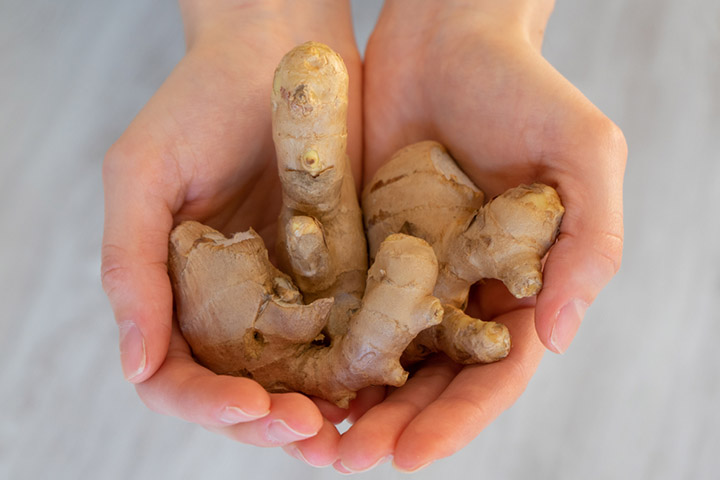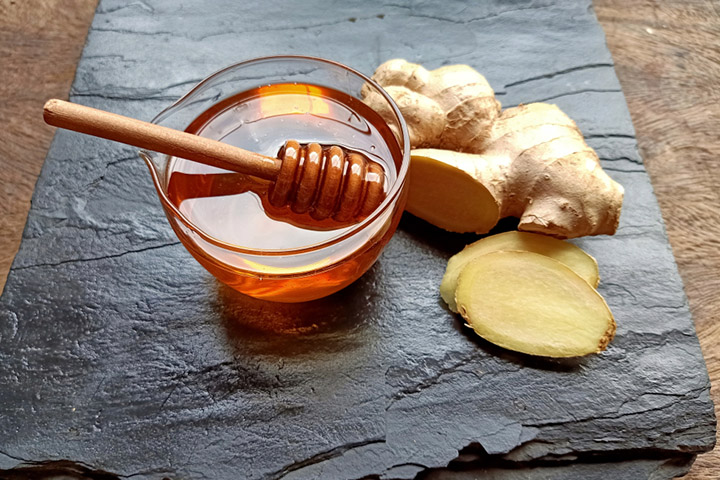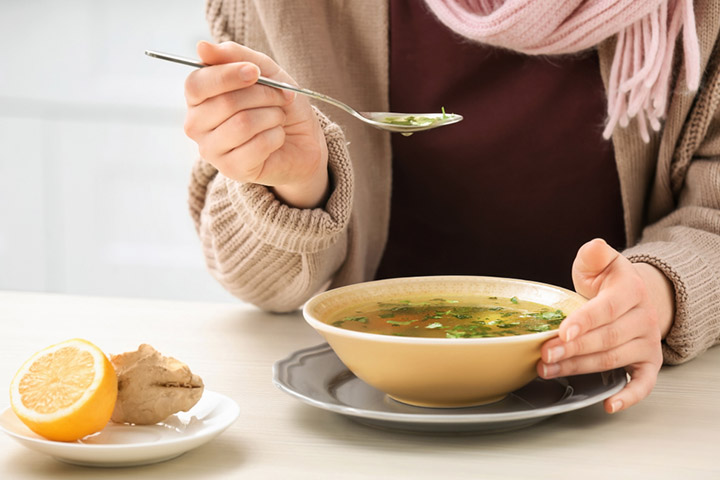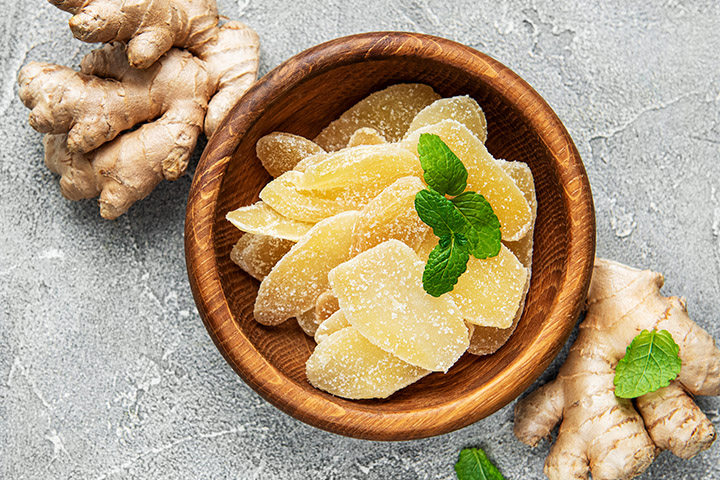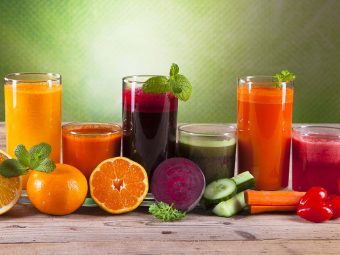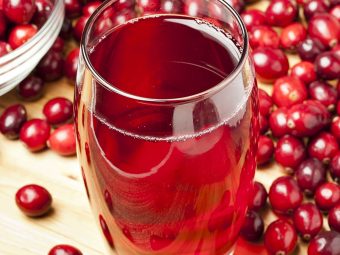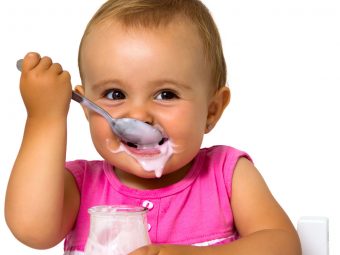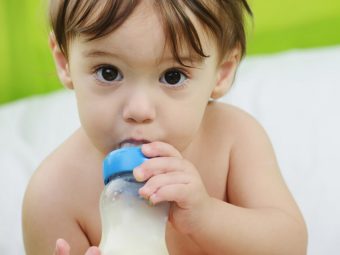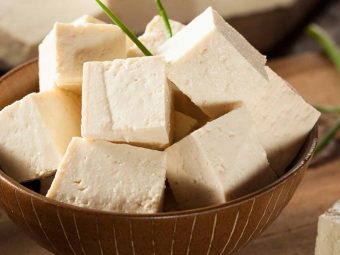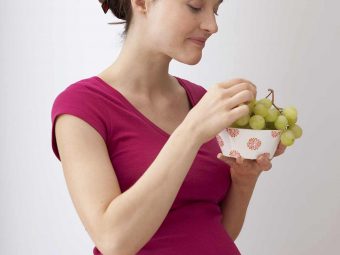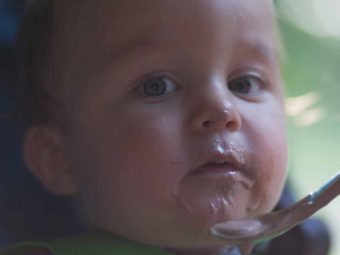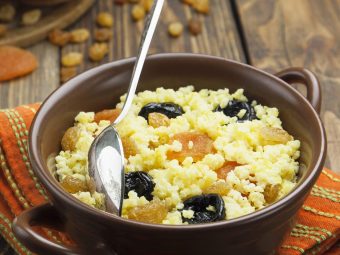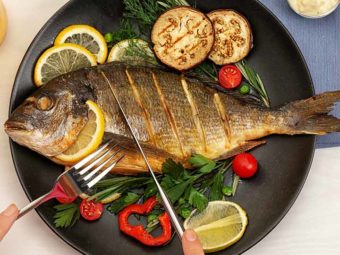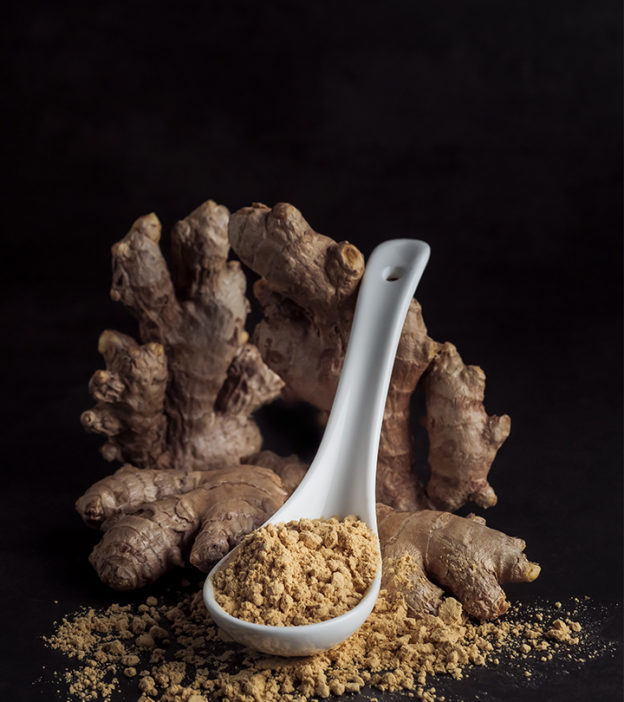
Image: iStock
Ginger is a common kitchen herb popular for its flavor and medicinal properties. Its use is prevalent to treat and manage ailments, such as cough, nausea, and gastric issues in adults.However, using ginger for babies needs caution as it can cause gastrointestinal discomfort, such as heartburn and gas in sensitive babies.
Thus, knowing the right age and age-appropriate ways to feed ginger to babies is essential. Keep reading to learn more about the safety of ginger, its possible health benefits, and ways to feed this herb to babies.
Ginger And Its Nutritional Value
Image: Shutterstock
Ginger is classified as an herb and is the most commonly consumed dietary condiment in the world(1). The rhizome is used in the culinary, drug, and cosmetics industries.
One hundred grams of ginger root contains the following nutrients.
| Nutrients | Amount |
|---|---|
| 水 | 78.89g |
| Fiber | 2g |
| Calcium | 16mg |
| Magnesium | 43mg |
| Phosphorous | 34mg |
| Potassium | 415mg |
| Choline | 28.8mg |
| Phytosterols | 15mg |
Source: USDA(2)
Ginger is also considered a good source of bioactive phenolic compounds, such as gingerol, shogaol, and paradols with terpenes like zerumbone(3). These compounds tend to display anti-inflammatory and anti-tumorigenic properties and could help in reducing the risk of certain cancers, although more research is necessary to determine their effectiveness.
 Quick fact
Quick factIs Ginger Safe For Babies?
Ginger is consideredsafe for babies, although there aren’t any studies suggesting a safe limit of its consumption by babies. The US Food and Drug Administration (US FDA) has marked ginger as GRAS (Generally Regarded As Safe). For adults, the recommended intake is up to four grams a day(4).
The FDA advises caution while using ginger inhome remediesor as alternative medicine.Ginger may have possible drug interactions, and thus, using it for babies in any of these forms must be done under a pediatrician’s guidance only.
Ginger’s use as a herbal medicine is not recommended for children below two years of age(5). Therefore, pediatric consultation is advised before you use ginger for any therapeutic purposes.
Health Benefits Of Ginger
Chemical analysis of ginger shows that it contains different compounds associated with positivehealth benefitsin humans(3)(5). Some that could be beneficial for babies are mentioned next.
- Antimicrobial, anti-fungal, and antiviral effects: Studies have shown that ginger has antimicrobial activity against E Coli, Salmonella typhi, and Bacillus subtilis. Babies are more vulnerable to bacterial attacks, and hence ginger could be used to prevent infections in them, albeit under a pediatrician’s guidance(6).Also, ginger is known to have antifungal and antiviral properties that could help enhance the immune system function(7).
- Carminative effects: Ginger’scarminativeiXSupplement or medication that can soothe the intestinal tract and reduce gas or bloatingeffects may help mitigate gastrointestinal issues such as delayed gastric emptying leading to constipation andflatulenceiXExpelling gas accumulated in the digestive system through the anusor bloating. It may also aid in relieving colic when used in conjunction with other natural remedies. However, one should consult a doctor before using ginger to treat any ailments in babies.
Image: Shutterstock
- Antiemetic properties: Ginger’santiemetic propertiesiXAbility to combat or prevent nausea or vomitingwas found to reduce nausea in patients with postoperative nausea and vomiting. So under pediatric guidance, the same may work for babies as well(7).
- Expectorant: The American Academy of Pediatrics (AAP) advises against the use of over-the-counter (OTC) medications for cough and cold in children(8). So, if your child’s pediatrician approves, you can use ginger as an expectorant to treat cough.Ginger juice, combined with honey, is a commonhome remedy for coughand cold(7).But note that honey is not recommended for babies under one year of age.
Image: Shutterstock
- Certain other components: Some studies have indicated that certain compounds in ginger directly relax the lungs and help ease breathing(9). In the case of bronchitis too, ginger has been found useful as a treatment
Various studies also indicate that ginger could help reduce pain.It generally inhibits the functioning of an enzyme that’s a significant component of the inflammatory response(10).Thus, if your baby is suffering fromear painor stomachache, ginger could be used.
If ginger has so many health benefits, then why do you need professional guidance to use it? The answer is simple: consumption of ginger could have possibleside-effects和药物的相互作用,没有推荐的dosage for babies. It is also important to follow a few precautions before using ginger for babies.
Recommended Precautions For Ginger Use In Babies
- Ginger may alter the effects of some medications. Thus, if your baby has been prescribed medicines, then check with your pediatrician before using ginger(9).
- The use of ginger with honey must be avoided for babies below one year because of the risk ofbotulismiXRare but severe condition caused by a toxin produced by the bacteria Clostridium botulinum(11).
- If your baby is sensitive to ginger, then some mild side-effects such as abdominal cramps, heartburn, diarrhea, gas, and flatulence could be expected(12).
- When including ginger for the first time in your baby’s diet, follow a three to five-day-wait rule to check if your baby is sensitive or intolerant to ginger.
With proper precautions, ginger can be used safely in a baby’s diet. Want to know how? Read next.
 Quick tip
Quick tipWays To Include Ginger In Diet
You can add ginger to your baby’s diet in one of these ways.
- Ginger soup: An effective natural remedy for digestion and other such gastrointestinal issues. Ginger has a warming effect and could be helpful for babies in controlling cough, cold, and flu. Including ginger, while cooking for babies may be health-benefiting and enjoyable. Try this recipe if your baby is nine to ten months, but begin with just a spoonful.
Image: Shutterstock
- Ginger milk: After one year, when most of the babies start taking cow’s milk, a teaspoon of ginger powder can be added to it to get relief from cough and cold and constipation.
- Ginger candy: You may try ginger candy or sticks for babies above two years.
Image: IStock
- Ginger water: Some people believe that giving fresh ginger water to babies above one year, post meals, can help in digestion. To make this, boil a few pieces of ginger in water for about 10 minutes. Strain and cool it and serve it to your baby with organic honey.
 Did you know?
Did you know?Frequently Asked Questions
1. How much ginger can I give to my baby?
There are no standard guidelines for the amount of ginger suitable for babies. However, it is required in very small qualities, and a pinch of dried ginger in a puree may be sufficient for babies.
2. Can ginger be given to babies with a history of allergies?
Ginger allergy is rarely reported and may occur in babies with a history of allergies(15). It is advisable to follow the three- to five-day wait rule when introducing ginger for the first time to your baby. Do not introduce any other new food during this time so that you may easily identify allergies and intolerances.
3. Can ginger be given to babies with medical conditions?
Ginger is not considered suitable for babies who are on medications such as blood thinners (ginger may increase the risk of bleeding) and those that treat diabetes (ginger may cause an additional lowering of blood glucose)(16).
4. Can ginger be given to premature babies?
It is not advisable to give ginger to premature babies. Experts suggest giving ginger to children two years and older(16).
Ginger for babies can be added to almost any homemade baby food as a spice or flavoring agent. It usually enhances the palatability of any dish if cooked well. Moreover, ginger serves the nutritional value of the recipes you try for your baby in the best way possible. However, try avoiding the overuse of ginger in your recipes, as your baby may not be able to tolerate the smell or taste. You must ensure to make use of it moderately and only in a few dishes. You may check with your baby’s pediatrician about the quantity of ginger that is safe to consume, especially if you are using it as a home remedy to cure something in particular.
Infographic: Precautions For Ginger Use In Babies
Ginger is a common ingredient used in various food and herbal preparations. However, when feeding ginger to babies, you must take proper precautions to prevent any possible side effects of ginger in babies. Check out the infographic below for valuable advice before giving ginger to your little one.
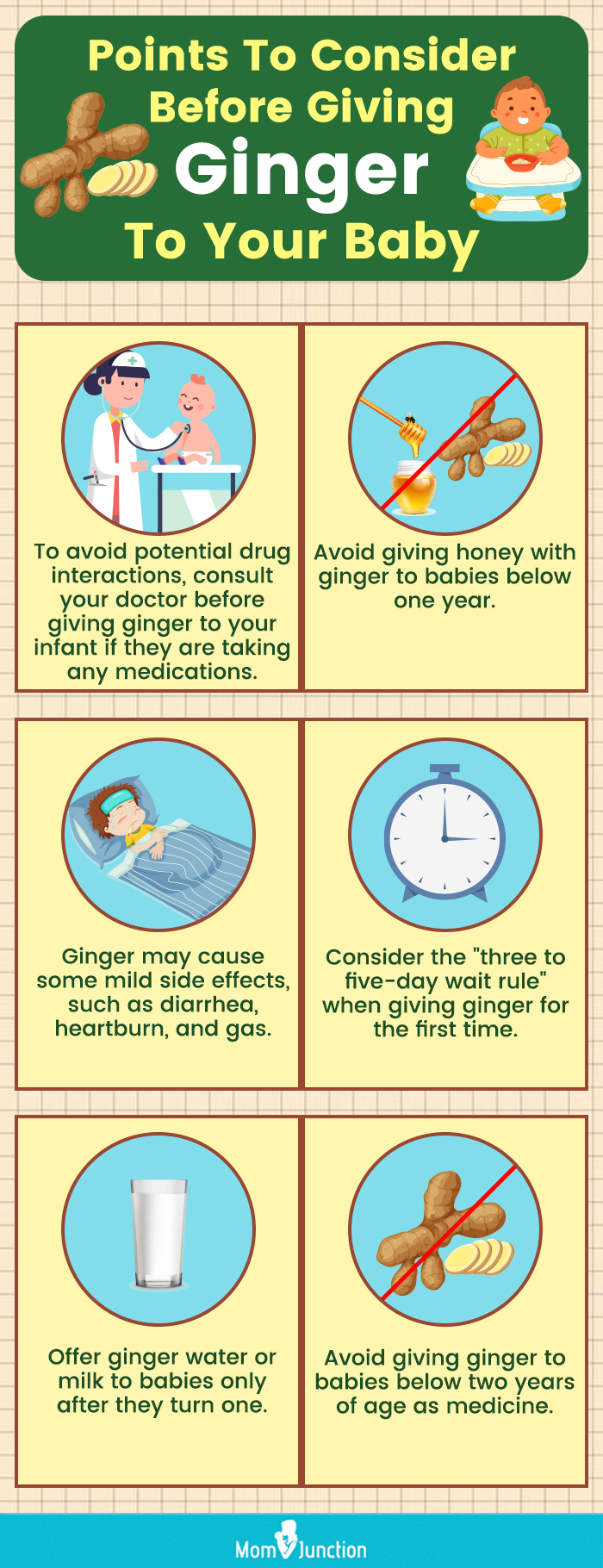
Illustration: Momjunction Design Team
Get high-quality PDF version by clicking below.
Download Infographic
Key Pointers
- Ginger can be included in the baby’s weaning diet after consulting a pediatrician.
- The use of ginger for medicinal purposes is not recommended for children below two.
- The moderate use of ginger can help boost immunity and reduce gastrointestinal issues.
- Ginger may be incorporated into a baby’s diet in soups, candies, or milk.
- Overconsumption of ginger may lead to certain medication-related side effects and undesirable health problems.
References:
2.Ginger root, raw;169231; FoodData Central; USFDA
3. Nafiseh Shokri Mashhadi et al.;Anti-Oxidative and Anti-Inflammatory Effects of Ginger in Health and Physical Activity: Review of Current Evidence;National Centre For Biotechnology Information (2013)
4. Julie L. Ryan and Gary R. Morrow;Ginger;National Centre For Biotechnology Information (2010)
5. E. Ernst and M.H Pittler;Efficacy of ginger for nauseous and vomiting: a systematic of randomized clinical trials;PubMed (2000)
6. Arshad H Rahmani et al.;Active ingredients of ginger as potential candidates in the prevention and treatment of diseases via modulation of biological activities;National Centre For Biotechnology Information (2014)
7. Neeru Bhatt et al;Ginger: A Functional Herb;Reesearch Gate (2013)
8.American Academy of Pediatrics;Choosing Wisely.
9. Elizabeth A. Townsend et al.;Effects of Ginger and Its Constituents on Airway Smooth Muscle Relaxation and Calcium Regulation;National Centre For Biotechnology Information (2013)
10. Beth Howard;Pain-fighting Foods;饮食和营养;AARP (2011)
11. Evan Ashkin and Anne Mounsey;一勺何ney helps a coughing child sleep;National Centre For Biotechnology Information (2013)
12.Ginger;National Institute of Health; National Centre For Complementary and Integrative Health (2016)
13.Wild ginger;Cornell Botanic Gardens
14.Baby ginger;capecod.gov
15. Patricia Gehlhaar et al.;Allergy to ginger with cysteine proteinase GP-I as the relevant allergen;Annals of Allergy, Asthma, And Immunology (2018).
16.Ginger;Mount Sinai



